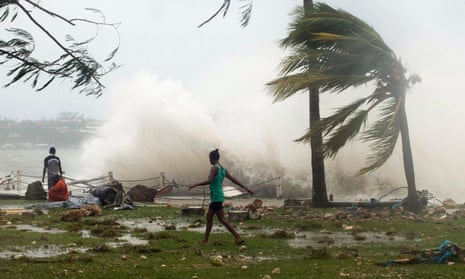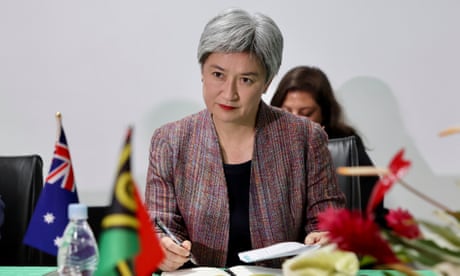
Pacific island country will put resolution to UN general assembly seeking opinion on international legal obligations that countries have to act on the crisis.
Wed 1 Mar 2023 18.00 AEDT
Last modified on Wed 1 Mar 2023 18.04 AEDTThe Pacific island country will soon put a resolution to the UN general assembly seeking an opinion on the international legal obligations that countries have to act on the climate crisis.
The resolution asks the ICJ to pay particular attention to the harm experienced by small island developing countries that are particularly vulnerable to the effects of the climate crisis.
Guardian Australia has learned that Australia has committed to co-sponsoring Vanuatu’s resolution at the UN general assembly.
The Albanese government is expected to portray this support as recognition that climate change is “the single greatest threat to the livelihoods, security and wellbeing of the peoples of the Pacific”.
Even though the ICJ advisory opinion will be non-binding, Australian officials expect it will consider the obligations of states under international law to protect the climate system and the environment, for present and future generations.
Australia is expected to advocate for including the obligations of all major emitters – past, present and future – arguing this is the best way to achieve maximum impact in terms of limiting global heating to 1.5C.
Australia joins at least 69 developed and developing countries that have committed to co-sponsor the resolution.
Vanuatu’s draft resolution asks the ICJ to lay out the legal consequences for countries that “by their acts and omissions” have caused significant harm to the climate system and other parts of the environment.
The resolution cites a range of sources for these obligations, including the international covenant on economic, social and cultural rights; the Paris agreement; and the UN convention on the law of the sea.
It also points to the principle of prevention of significant harm to the environment and the duty to protect and preserve the marine environment.
The ICJ will also be asked to consider “peoples and individuals of the present and future generations affected by the adverse effects of climate change”.
Australia has previously expressed support for Vanuatu’s initiative in broad terms, but had faced calls to go further and actually co-sponsor the general assembly resolution.
Civil society groups wrote to the foreign affairs minister, Penny Wong, last week urging Australia to “step up and support our Pacific family”.
Greenpeace Australia Pacific, Amnesty International Australia, Climate Action Network Australia and Oxfam Australia said supporting the resolution would “reinforce Australia’s dedication to climate ambition, to intergenerational equity, and a climate safe future for all”.
The deputy leader of the Greens, Mehreen Faruqi, had also called for “clear and unambiguous commitments from Australia to show solidarity with our Pacific neighbours who are facing the worst threats from climate change”.
“The time for nice-sounding words is over,” Faruqi said last week. “An ICJ advisory opinion could be a powerful way of driving countries to take stronger climate action.”
The Albanese government has legislated its pledge to cut emissions by 43% by 2030 and net zero by 2050 – but has stopped short of banning new coal and gas developments, a key request from Pacific leaders.

No comments:
Post a Comment